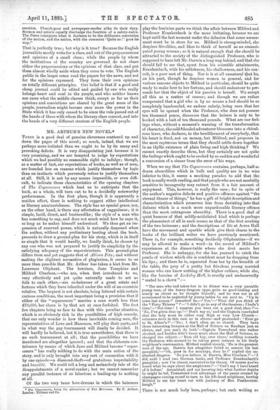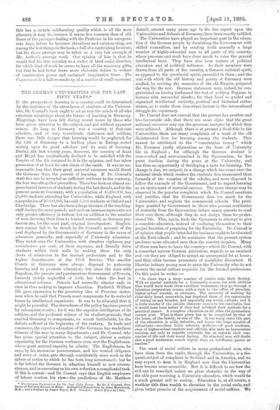MR. ARTHUR'S NEW NOVEL.*
THERE is a good deal of genuine cleverness scattered up and down the pages of this novel ; so much, indeed, that we are perhaps more irritated than we ought to be by its many and provoking defects. It is very disappointing just because it is very promising, and we are tempted to judge by expectations which we had possibly no reasonable right to indulge; though, as a matter of fact, our expectations of books, as well as of men, are founded less on reasons which justify themselves by logic than on instincts which perversely refuse to justify themselves at all. Still, it is not by any means impossible, or even difficult, to indicate those characteristics of the opening chapters of The Copareeners which lead us to anticipate that the book, as a whole, will turn oat to be a decidedly noteworthy performance. In the first place, though it is apparently a maiden effort, there is nothing to suggest either intellectual or literary amateurishness. The style has no special grace, nor, on the other hand, is there any affectation of ruggedness ; it is simple, lucid, direct, and businesslike ; the style of a man who has something to say, and does not much mind how he says it,, so long as he makes himself understood. We thus get an impression of reserved power, which is naturally deepened when the author, without any preliminary beating about the bush, proceeds to draw a ground-plan for his story, which is in itself so simple that it would hardly, we fondly think, be chosen by any one who was not prepared to justify its simplicity by the satisfying adequacy of the superstructure. This gronnd-plan differs from and yet suggests that of Altiora Pete ; and without making the slightest accusation of plagiarism, it seems to us more than possible that Mr. Arthur has taken a hint from Mr. Lawrence Oliphant. The heroines, Jane Tompkins and Mildred Charlson,—who are, when first introduced to us, very effectively and yet quite naturally made to act as foils to each other,—are co-heiresses of a great estate and fortune which they have inherited under the will of an eccentric relative. The bequest is not absolute, being fettered with certain curious conditions, the most important being a provision that if either of the " coparceners " marries a man worth less than £10,000, her share is by that act at once forfeited. The first few chapters bring us face to face with this peculiar.situation, which is so obviously rich in the possibilities of high comedy, that our only wonder is how these inevitable coming men, the representatives of Love and Mammon, will play their parts, and in what way the gay tournament will finally be decided. It will hardly be believed, but it is true nevertheless, that there is no such tournament at all ; that the possibilities we have mentioned are altogether ignored ; and that the elaborate contrivance by means of which Jane and Mildred become " coparceners " has really nothing to do with the main action of the story, and is only brought into any sort of connection with it by one episode—a diamond-theft—of gratuitous improbability and banalite. We could tell a long and melancholy tale of the disappointments of a novel-reader; but we cannot remember any parallel instance of so laborious a leading-up to nothing at all.
Of the two very tame love-dramas in which the heiresses play the feminine parts we think the affair between Mildred and Professor Krankenbach is the more irritating, because we are kept until the last moment under the delusion that some amusement must be in store for us. Mildred is strong-minded, she despises frivolities, and likes to think of herself as an emancipated young woman ; so it is natural enough that she should be attracted to the society of the distinguished Professor, who is supposed to have left Mr. Darwin a long way behind, and that she should fail to see that apart from his scientific attainments, Krankenbach, with his selfishness, his shallowness, and his conceit, is a poor sort of thing. Nor is it at all unnatural that he, on his part, though he despises women in general, and for various reasons objects to Mildred in particular, should be quite ready to make love to her fortune, and should endeavour to persuade her that the object of his passion is herself. We accept
all this as a matter of course ; and though we are rather exasperated that a girl who is by no means a fool should be so completely bamboozled, we endure calmly, being sure that her eyes will be opened when the Professor, who does not possess
ten thousand pence, discovers that the heiress is only to be hooked with a bait of ten thousand pounds. What are our feelings when, without a moment's warning of the transformation of character, the cold-blooded adventurer blossoms into a chival rous lover, who declares, to the bewilderment of everybody, that his heart is fixed, not on money, but Mildred, and proposes in the most rapturous terms that they should settle down together in an idyllic existence of plain living and high thinking P We cannot exactly describe them, but they certainly are not quite the feelings which ought to be evoked by so sudden and wonderful a conversion of a sinner from the error of his ways.
When we say that The Copareenere contains, perhaps, half-adozen absurdities which in bulk and quality are in no wise
inferior to this, it seems a mocking paradox to add that the
book is really worth reading, and that people who are not morbidly sensitive to incongruity may extract from it a fair amount of enjoyment. This, however, is really the case ; for in spite of the author's negative defects and positive offences against "the eternal fitness of things," he has a gift of bright description and characterisation which preserves him from deviating into that dulness which is a much more unpardonable literary offence
than the most outrageous absurdity. There is a good deal of quiet humour of that mildly-acidulated kind which is perhaps the pleasantest of all in such scenes as that of the first meeting of the two heiresses ; and the descriptions of life at Acres Hall
have the movement and sparkle which give their charm to the books of the brilliant writer we have previously mentioned.
There is, for example, something decidedly Oliphantine—if we may be allowed to make a word—in the record of Mildred's experiences at the dinner-table where she first meets her Professor. She is unhappy, for she has yearned to catch the pearls of wisdom which she is confident must be dropping from his lips ; and there he is, separated from her by the breadth of the table, the prey of a pretty but frivolous young married woman who can know nothing of the higher culture, while she, like the heroine of Lockeley Hall, is cruelly and undeservedly " mated to a clown ":—
" The man who had taken her in to dinner was a very passable young man, of the heavy-dragoon type, quite as good-looking and nearly as clever as he thought himself ; and ho was not at all accustomed to be neglected by young ladies he sat next to. Up in town last season ?' remarked he.—' Yes.'—' What did you think of the " Forty Thieves " ?'—' I didn't go to any of the theatres ; I hadn't time.'—' Not time ! I suppose you went oat a good deal, then ?'— No, I've given that up.'—' Don't say so,' and the Captain concluded that the lady must be either very High or very Low Church— extremes meet in this case as in others—and proceeded : Ever go to St. Alban's ?'—' No ; I don't often go to church. They have those interesting lectures at the Hall of Science on Sundays just at eleven, and you can't do botb.'—Captain Townshend was rather shocked, and besides didn't know much about the Hall of Science, so changed the subject.—' Rum old boy, over there,' nodding towards the Professor, who seemed to be taking great interest in his lively neighbour's conversation. Mildred replied sternly, He is the greatest man of the age. Darwin has altogether failed to answer his last pamphlet.'—' Oh, goes in for monkeys, does be ?' replied the unabashed dragoon. ' Do you believe in Darwin, Miss Charism ?'—' did, until I read two German books, and Professor Krankenbach's pamphlet ; now I'm almost converted to his theory. Of course you've heard what he says about the ampbioxus ?'—' Can't say I have heard of it before.' Astonished, and not knowing into what further depths he might be led, Townshend took advantage of the pause created by champagne coming round to tarn to his left-hand neighbour, leaving Mildred to eat her heart out with jealousy of Mrs. Featherstonbaugh."
There is not much body here, perhaps ; but such writing as this has a certain exhilarating quality which is all the more pleasant, it may be, because it seems less common than of old. Some of the passages dealing with the Professor in his unregenerate days, before Ile becomes chivalrous and uninteresting, are among the best things in the book,—full of a captivating humour ; but the above passage may be taken as a very fair example of Mr. Arthur's average work. Our opinion of him is that he would find his true vocation as a writer of brief social sketches, for which kind of work he seems to have all the necessary gifts, but that he had better leave more elaborate fiction to writers -of constructive power and sustained imaginative force. The Coparceners is a failure made-up of a number of small successes.



































 Previous page
Previous page